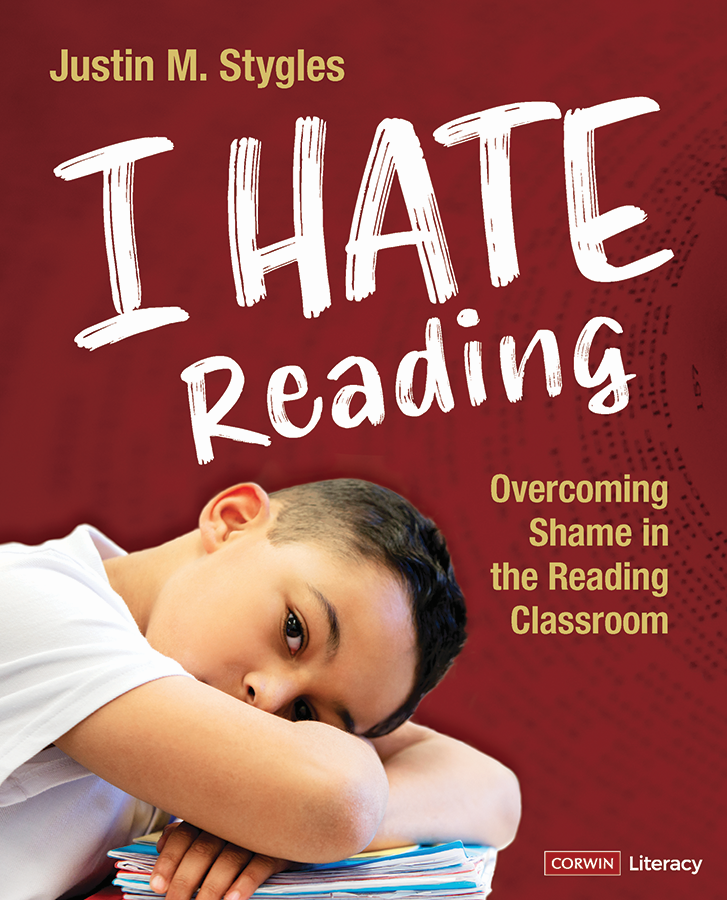I’ve been attending literacy conferences for over a decade. I’ve always been amazed at the featured speakers and keynotes. They speak so confidently. For me, it’s often been inspiring but challenging to listen. What they talk about, what they do in their classrooms… they’re so… perfect. Clearly, everyone in their classrooms is excelling. Why else would they be talking about their degree of success? Why would they have publications promoting their practice?
In all the time it took me to write I Hate Reading, I was committed to making myself look less than perfect. For one, as the book entails, and what is left out, there are many reasons students hate reading. One of those reasons, as I described, is me.
I never set out to be a nasty literacy teacher. I never set out to tell students they were bad readers or that I implied they were bad. But accidents happen; pressure, stress, and image can often have negative consequences.
In my case, I had great test scores. It was the NCLB era and I wanted to prove I was the best teacher. I also adored who I was listening to and gaining such great insight from. I wanted to be them. I wanted to be accepted by them. The only way I could make that happen was to prove that every student in my classroom was just as successful as theirs! How else could I justify writing a book? If I was looking at why they didn’t read and converting that into the reasons students did read, I would finally make the big time.
Wrong.
Every time I (felt) had to prove myself to gain the attention of an administrator or someone who had an influence on any career trajectory I perceived, catastrophes happened. While that may sound dramatic, the fact is, that even spurning one student from reading is a tragedy.
As I wrote years ago on an IlA Today blog, letting go is the best medicine.
There are times when students are going to resist reading on their own volition. They flat-out don’t want to do it. They will balk, stall, pretend, ignore, and maybe once and a while give it an attempt. I can’t be the only one who has seen this. In a previous life, that is the one that led me to the book, I would nudge, coerce, get cranky, and demand that they. To be honest, it worked for many. It was my anger that often would be the straw, so to speak.
This is not a very professional approach. In today’s “anxious generation,” this approach doesn’t work. Patience does. So does giving up and letting the horse eventually come to water alone.
What do I mean?
I once had a student who despite all the invitations to read one could ask for, he flat out wouldn’t read. If it was a rereading of a graphic novel, he might be game. Otherwise, nothing. It was tragic to watch me fail. Starting off below grade level on the fall benchmark assessment, the student didn’t budge from that level all year, sans increased WPM. Come April, I became cranky with a lack of progress. The most I could say was a command – “You need to read” or a plea, “Please, you gotta make an effort to read.”
Still. Nothing.
Why?
The painful fact of inspiring students to read is that we cannot control them. We can only provide skills and strategies they adopt into their reading lives. We can’t poke them everything they go off task. We can’t ensure they read all the words on the page.
Sometimes, the best we can do as reading teachers is to plant the seeds. If we create a responsive reading classroom, provide access to text, and teach the strategies students need to dig deeper into text, we’ve planted seeds. I can no longer influence this student. They have to make the effort on their own when they are ready. The fact is, he was always happy in my class. He knew he was welcome, even if he didn’t read, or I could be a curmudgeon every so often. It’s not his fault what happens when he have the chance to read or what might be distracting him internally when he tries. All I can do is provide opportunities, plant seeds, and nudge from time to time.
Am I mad at myself for not being perfect? For not getting all students to read. For not being like every other superstar teacher? I sure am. I cannot define any level of elitism because of student’s choices to read. All I can do is plant the seeds. Who knows maybe in time I might hear something like, “I never read in his class, but I read all the time now because I know how.”

Leave a comment